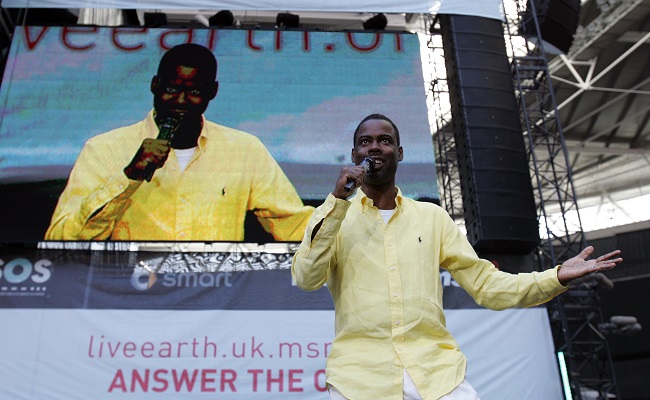
The 88th Academy Awards have been plagued by the #OscarsSoWhite controversy. After several proposed boycotts and criticisms of said boycotts, however, one thing remains clear — host Chris Rock will surely tackle the controversy head on. This is a good thing, and not just because Rock is the perfect, comical-yet-biting person to host the Oscars telecast. Nor is it good simply because his second crack at the gig will fare better than his first did in 2005. Rather, his decision to remain the master of ceremonies is great because his track record proves just how little he cares about appeasing the showrunners and event planners who try to control him. Like when he appeared at the 2007 Live Earth concert on the BBC.
On July 7 of that year, former American vice president Al Gore and producer Kevin Wall put on Live Earth — a live, simulcast television and internet event featuring musical acts and entertainers at locations all over the globe. From Wembley Stadium in the United Kingdom and Giants Stadium in New Jersey, to similar venues in South Africa, Japan and elsewhere in Europe, dozens of musicians, bands, and celebrities banded together to raise money against and awareness for climate change. Rock was one of the many personalities who turned up for the event, and when he launched into one of his trademark abrasive deliveries while introducing the Red Hot Chili Peppers in London, the BBC immediately censored and censured him.
What did Rock say or do, exactly? Did he make fun of the Chili Peppers’ music? Did he call Her Majesty the Queen of England a “motherf*cker”? None of the above. Instead, he swore several times during the live broadcast, which forced the BBC to immediately apologize to its viewers for any possible offense.
“There are a lot of people out there who say that global warming is a myth. So what are these people really saying? ‘Let’s not do anything’?” Rock told the crowd. “Let’s talk to our governments, okay? Let’s talk to the people. Let’s get smaller-ass cars, okay? Every day in Jamaica, a little baby bursts into flames. So let’s stop it right now.”
Yeah, he said the word “ass” to a stadium filled with thousands of people, as well as to cameras broadcasting his remarks to millions of viewers across the planet. If anything, it seems far less harmless than exaggerating the real-world damages of climate change with a funny but false example of its effects. Yet that wasn’t all Rock said during his brief stint onstage. He also blurted out the word “motherf*cker,” which made it out onto the BBC’s telecast moments before producers cut the sound, fearing that Rock would continue using vulgar language in his address.
Co-presenters Jonathan Ross and Graham Norton, who were working from the main BBC studios in London, immediately apologized to viewers on behalf of the network. The two noted that all parties involved in the broadcast had been warned about using any words or phrases that could be deemed offensive to the audience. Of course, it was live television, so no matter how much advance warning producers gave talent to avoid outbursts, Rock and other entertainers (like Madonna) were able to squeeze in a few curses.
Following the program, a spokesperson for the BBC again apologized in a formal statement.
“It was a live broadcast with no delay so we did all we could to remind the artists that they were going on live on TV and to refrain from swearing… When any of them did get carried away we pulled away from it immediately and apologised.”
Even so, the network received 134 complaints about Rock’s use of the words “ass” and “motherf*cker.” Along with an additional 15 grievances issued with the British communications regulator, Ofcom, the African-American comedian’s short appearance during Live Earth garnered an entertaining array of written scorn. Highlights included, but were not limited to:
- “It was pretty bad at that time of day.”
- “It was disgusting behavior.”
- “There is a line to be drawn.”
- “Why did the BBC transmit this during daytime TV when many children will be watching? Why hasn’t an apology been immediately forthcoming?”
The apology demanded by the last complaint above was given by the BBC. However, no such thing was ever uttered or admitted to by Rock himself. During a subsequent appearance, the comedian was asked about the controversy his words had inspired within the British news media. His response? “I like to say those things,” he quipped. “It’s not good weed if you don’t choke.” When his questioners pushed him further on the issue, Rock turned the tables on them and the Live Earth event itself with a rather snappy line that summarized his (and many others’) general disdain for the event itself: “I think this will do for global warming what Live 8 did for ending world hunger.” Though nonspecific, Rock’s counter criticisms were somewhat prescient, as nonprofit organization Intelligent Giving (now a part of NPC) was unable to determine where exactly the money raised by Live Earth was going.
As you can see, Rock didn’t care for the British censors in 2007 and he didn’t seem as though he was bothered when his appearance at the 77th Academy Awards in 2005 generated the lion’s share of FCC complaints targeting the broadcast that year. All of this suggests that he may be filter-free when he takes the stage and possibly takes aim at the Oscars’ lack of diversity on Sunday; which should, in the last, make for compelling television.
(Via NME, BBC & Daily Mail)






